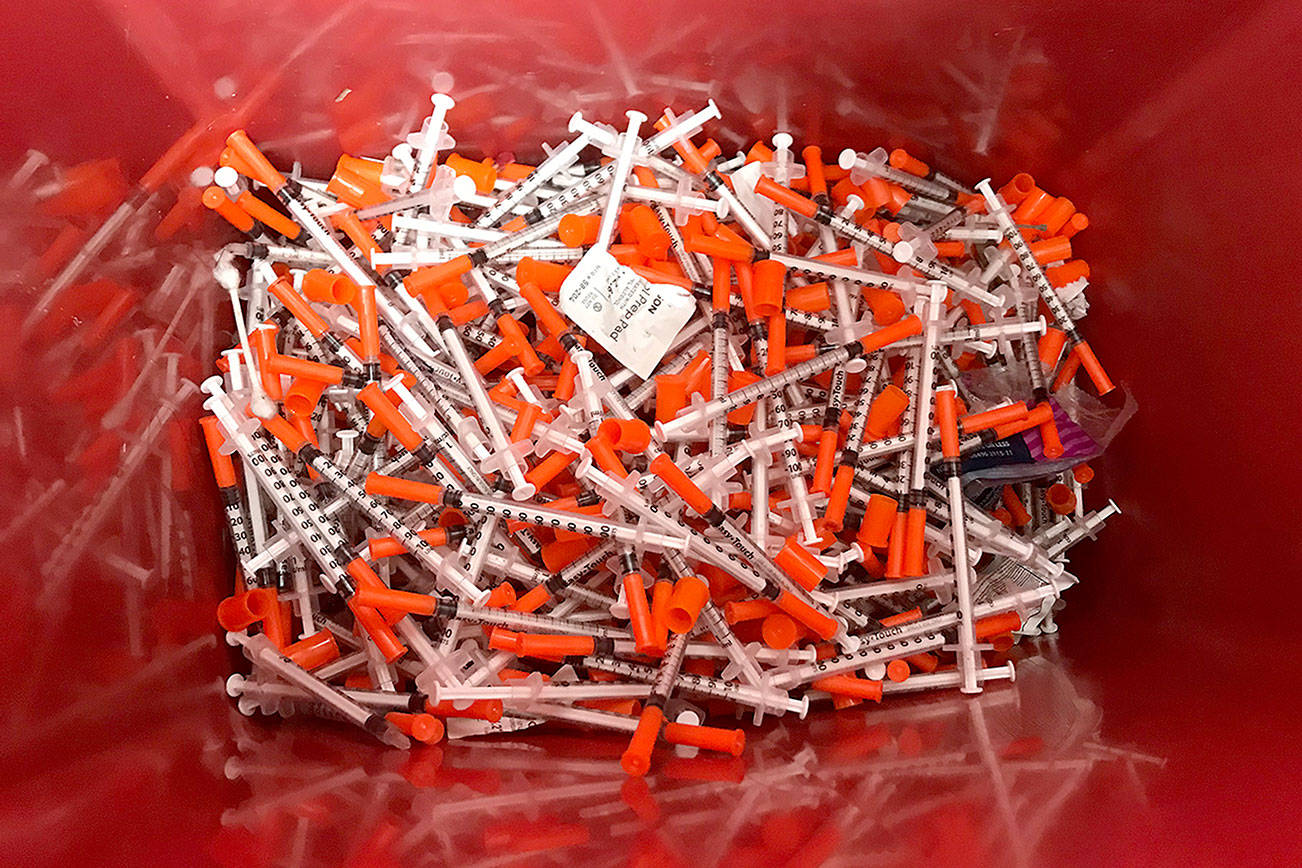With Grays Harbor County’s syringe exchange slated to end June 30, public health and fire officials are concerned that doing so would also eliminate the county’s naloxone distribution program, and possibly cause the county to miss out on future state and federal funding in other areas of the community.
Aberdeen Fire Chief Tom Hubbard, who helped draft an informational sheet with Grays Harbor Public Health and Social Services that lists benefits of syringe exchanges, said he fears possible negative side effects of getting rid of the exchange.
“With the cascade effects of taking away the syringe program, I’m really sad that’s the way it landed,” said Hubbard at Wednesday’s Aberdeen Public Safety Committee meeting.
Naloxone, a medicine that reverses the effects of an opioid overdose to avoid possible death, has been provided to the county through a federal grant from the University of Washington since February 2017. Kits of the medicine have been distributed by a variety of community partners, and are carried by many law enforcement officers in case they need to save someone overdosing.
Because the University of Washington grant is tied to there being a syringe exchange — which is run out of a motorhome vehicle under the Chehalis River Bridge in Aberdeen that also gives out naloxone — the county’s Public Health Manager Kristina Alnajjar said losing the syringe exchange would mean the funding for naloxone would also go away.
The funding for the syringe exchange also pays for a full-time employee to give trainings all around the county for using naloxone and ties into the other services at the syringe exchange, like giving medical referrals and other basic health supplies.
In the health department’s information sheet, it also says they anticipate “more collaborative state and federal funding will become available to the community if there is a syringe exchange program.”
Alnajjar elaborated, saying that syringe exchanges are “really a foundational piece of a lot of HIV, a lot of Hepatitis C elimination efforts,” and that funding can potentially come to the community through other avenues outside of the health department, like the police or Emergency Medical Services, but only if there’s a syringe exchange.
The syringe exchange is open once a week, and allows anyone to exchange contaminated needles for clean ones, often used for drugs like heroin.
Randy Ross was the lone commissioner who voted against ending the program in a 2-to-1 vote Dec. 19, that included Commissioners Vickie Raines and Wes Cormier, who voted to end it. Ross hopes the issue is brought up at the county’s Board of Health meeting on Jan. 24.
“It would be a horrendous burden on our community both financially, and I can’t imagine the emotional toll it would take on families who lose a loved one because they couldn’t get their hands on naloxone,” Ross told The Daily World. “We’re just at the tip of the iceberg when it comes to the opioid epidemic, and the issues with fentanyl we’re starting to see.”
Cormier’s original resolution would’ve ended the program on Feb. 1, but Raines requested that the date get pushed back to June 30 to consider other options for the program. Raines said she has “great concerns” about the naloxone program ending, and that her goal is to find another agency to run the program, similar to Cowlitz County, which ended its county-run syringe exchange in September 2017 but had a private group continue the service.
The county’s Health Department officials have reached out to agencies in the community to discuss potential other groups that could offer the program if the county’s syringe exchange does end, but Alnajjar said no clear path forward is set in stone.
“I think from a public health perspective, we have the mandate to protect the public’s health,” said Alnajjar. “If that is completely impossible for us to be in the game to do it, we will ensure it happens. But we still view it as our responsibility.”
Raines added she thinks the commissioners will have “a much clearer picture” of the program’s future in the next several months.
The exchange program has been a divisive issue in the community, with supporters saying it’s beneficial because it helps prevent higher numbers of diseases and infections such as HIV and Hepatitis C that get transmitted more easily when dirty needles are used. Others are against the program, like Cormier, who said the program is enabling and isn’t a correct use of county funds.
Some in the community have said on social media that they would be OK if the program goes away and leads to a higher number of people contracting disease. Hubbard said he has taken heat on radio interviews after saying he thinks it’s a valid program.
“People were calling in saying, ‘Well they should just be left to die,’” said Hubbard. “I said, ‘That is how some people feel. Lucky are you if you don’t have a family member or friend who has been addicted to opiates. That’s not for us to judge.’”



